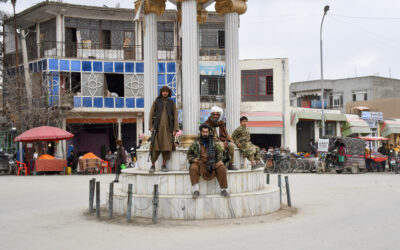
The Long Arm of China’s Security Services
SUBSCRIBER+ EXCLUSIVE REPORTING — When Chinese President Xi Jinping came to San Francisco last November to meet with President Joe Biden, Chinese pro-democracy activists in […] More
OPINION – On the eve of the US midterm elections, it is a good time to reflect on cyber threats to our political process, particularly from foreign state adversaries due to their vast resources, advanced capabilities, and malign intent. Cyber threats to our election system come from other, non-state sources as well, such as hacktivists and criminal organizations, but while they can also cause problems, they are not on the same scale or competence level as those posed by autocratic states, like China, Russia, and Iran.
We normally think of foreign cyber threats in terms of espionage, economic competition, or disruptive attacks against military and infrastructure targets, but more and more we are seeing them attack our internal political processes as well. Why?
The answer is that we are in the midst of a world-wide struggle between contrasting visions of the proper relationship between peoples and their governments, a Second Cold War, if you will.
China is a Communist police state; Russia broke with Communism but retained repressive habits from its Soviet and Tsarist past; and Iran is a theocracy in which ultimate political power resides with an unelected “Supreme Leader” who rules for life. Throw in the North Korean, Cuban, and Venezuelan Marxist dictatorships for good measure. What these very different countries all have in common is an authoritarian philosophy of government. For them, the mere existence of functioning democracies in which the government derives its authority from the consent of the governed through regular, fair, and competitive elections represents a fundamental threat to their legitimacy.
These repressive state actors thus have a deep interest in undermining democracies to portray them as chaotic, dysfunctional, and corrupt, and we see growing cyber-enabled actions by all of them to sow doubt, confusion, and discord among us. While some of them may try to sway election results in one direction or another due to some perceived advantage to be gained from particular outcomes, their goals in this regard often conflict. It is their disdain and fear of democracy itself that truly unites them.
Get your 10-minute national security daily brief with Suzanne Kelly and Brad Christian by listening to The Cipher Brief’s Open Source Report Podcast wherever you listen to podcasts.
The good news is that, at least for the United States, current safeguards and redundancies make it unlikely that any foreign actor could materially alter US election results via cyber manipulation, but that does not mean foreign cyber threats to our democratic processes are not grave. Autocratic state actors and cyber criminal organizations aligned with them are intensely focused on compromising the information networks used by institutions administering elections, election management systems, and political campaigns. And their efforts are ongoing.
In democracies, political and societal divisions play out in the open, often passionately, and our enemies study these carefully. The main risk from election-focused foreign hacking is less that it will affect elections directly, but that breaches and subsequent leaked insider information will be manipulated and amplified using inauthentic or controlled social media and other outlets to pour gasoline on the embers of our domestic tensions to inflame attitudes, cloud reason, and generate anger and hate, thereby strengthening internal forces less beholden to the idea of democracy.
Subscriber+Members have a higher level of access to Cipher Brief Expert Perspectives on Global Issues. Upgrading to Subscriber+ Status now.
The antidote to outside interference is greater awareness that it is happening, increased knowledge of the tricks our enemies play, and learning the prudent steps we can take to avoid them. All magicians know that once an audience understands what’s behind their illusions, their power to deceive erodes. Our diplomats, spies, and increasingly the vibrant open source intelligence community must continue to detect and expose the dark practices of democracy’s adversaries, and our civil society must demonstrate the maturity to recognize and reject them.
Democracies will always be complex and messy, like the people who comprise them. Nevertheless, all sides must take a firm stand against malicious outside actors who seek to undermine our system, a system which, to paraphrase Winston Churchill, while imperfect is far better than any of the alternatives.
Read more expert-driven national security insights, perspective and analysis in The Cipher Brief
Related Articles

SUBSCRIBER+ EXCLUSIVE REPORTING — When Chinese President Xi Jinping came to San Francisco last November to meet with President Joe Biden, Chinese pro-democracy activists in […] More

SUBSCRIBER+EXCLUSIVE EXPERT PERSPECTIVE — More than two years after its withdrawal from Afghanistan, the U.S. still does not have a clear way forward in the […] More

SUBSCRIBER+ EXCLUSIVE REPORTING — Ukrainians greeted Saturday’s long-awaited House passage of $60.8 billion in aid with justifiable jubilation. For months, their soldiers, civilians, and political […] More

SUBSCRIBER+ EXCLUSIVE REPORTING — A race for control of space is underway, and just as on earth, the U.S. and China are the top competitors. […] More

SUBSCRIBER+ EXCLUSIVE REPORTING — For nearly a week, the Middle East and much of the world were on a knife’s edge, waiting for a promised […] More

BOTTOM LINE UP FRONT – Less than one week after Iran’s attack against Israel, Israel struck Iran early on Friday, hitting a military air base […] More
Search